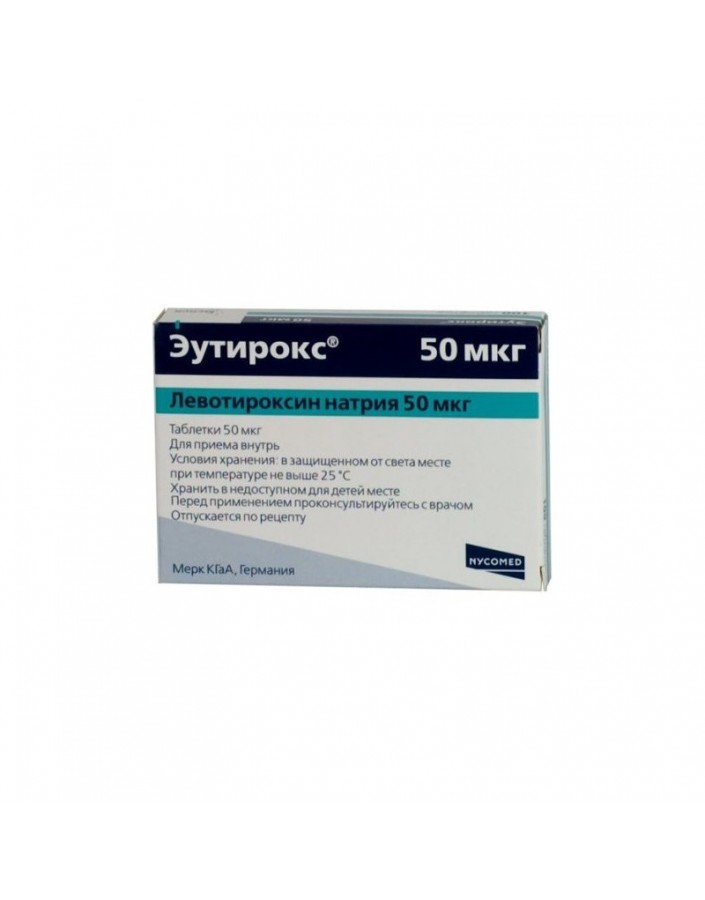




Security policy (edit with Customer reassurance module)

Delivery policy (edit with Customer reassurance module)

Return policy (edit with Customer reassurance module)
Eutirox pills:
1 pill contains levothyroxine sodium 25, 50, 75, 100, 150 mcg;
Excipients: corn starch, lactose monohydrate, Magnesium stearate, gelatin, croscarmellose sodium.
50 or 100 pills per pack.
Eutirox is a preparation of thyroid hormones. Synthetic levorotatory isomer of thyroxine. After partial transformation into triiodothyronine (in the liver and kidneys) and transition into the cells of the body, it affects the development and growth of tissues and metabolism. In small doses, it has an anabolic effect on protein and fat metabolism. In medium doses, it stimulates growth and development, increases the tissue's need for oxygen, stimulates the metabolism of proteins, fats and carbohydrates, and increases the functional activity of the cardiovascular system and the central nervous system. In large doses, inhibits the production of thyrotropin-releasing hormone hypothalamus and thyroid-stimulating hormone of the pituitary gland.
The therapeutic effect is observed after 7-12 days, during the same time the effect is preserved after drug withdrawal. The clinical effect in hypothyroidism appears after 3-5 days. Diffuse goiter decreases or disappears within 3-6 months.
Euthyroid goiter; hypothyroidism; after resection of the thyroid gland as replacement therapy and to prevent recurrencegoiter; thyroid cancer (after surgery); diffuse toxic goiter after reaching the euthyroid state with thyreostatics (as a combination therapy or monotherapy); as a diagnostic tool when conducting a thyroid suppression test.
The daily dose is determined individually depending on the evidence.
Eutirox is taken orally in the morning on an empty stomach 30 minutes before a meal, washing down a pill with a small amount of liquid (half a glass of water) and not chewing.
When conducting replacement therapy for hypothyroidism in patients under the age of 55 years in the absence of cardiovascular diseases, Eutirox is prescribed in a daily dose of 1.6-1.8 mcg / kg body weight; in patients older than 55 years or with concomitant cardiovascular diseases - 0.9 mcg / kg of body weight.
With significant obesity, dose calculation should be done on "ideal weight".
With replacement therapy for hypothyroidism, the initial dose for patients under the age of 55 years (in the absence of cardiovascular diseases) is 75–100 mcg / day for women, and 100–150 mcg / day for men. For patients older than 55 years or with concomitant cardiovascular diseases, the initial dose is 25 mg / day; increase the dose should be 25 mcg with an interval of 2 months to normalize the level of TSH in the blood; when symptoms or deterioration of the cardiovascular system occur, correct the appropriate therapy.
In severe long-term hypothyroidism, treatment should begin with extreme caution with small doses of 12.5 mcg / day. The dose is increased to maintenance at longer intervals - at 12.5 mcg / day every 2 weeks - and the level of TSH in the blood is determined more often.
When treating congenital hypothyroidism in children, doses of the drug depend on age.
Infants receive a daily dose of Eutirox in 1 dose 30 minutes before the first feeding. The pill is dissolved in water to a thin suspension immediately before taking the drug.
In the treatment of euthyroid goiter prescribe 75-200 mg / day.
For the prevention of relapse after surgical treatment of euthyroid goiter - 75-200 mg / day.
In the treatment of thyrotoxicosis - 50-100 mg / day.
For suppressive treatment of thyroid cancer - 50-300 mg / day.
In hypothyroidism, Eutirox is usually taken for a lifetime. When thyrotoxicosis, Eutirox is used in complex therapy with thyrostatics after reaching the euthyroid state. In all cases, the duration of drug treatment is determined individually.
Allergic reactions are possible.
Untreated thyrotoxicosis; acute myocardial infarction; acute myocarditis; untreated adrenal cortex insufficiency; increased individual sensitivity to the drug.
Carefully the drug should be prescribed for IHD (atherosclerosis, angina pectoris, a history of myocardial infarction), arterial hypertension, arrhythmia, diabetes mellitus, with severe long-term hypothyroidism, malabsorption syndrome (dose adjustment may be required).
Therapy with a drug prescribed for hypothyroidism should continue. When pregnancy requires an increase in the dose of the drug due to increased levels of thyroxin-binding globulin. The amount of thyroid hormone secreted in breast milk during lactation (even during treatment with high doses of the drug) is not enough to cause any disturbances in the child.
The use of the drug during pregnancy in combination with thyreostatics is contraindicated, because taking levothyroxine may require an increase in thyrostatic doses. Since thyreostatics, unlike levothyroxine, can penetrate the placenta, hypothyroidism can develop in the fetus.
During the period of breastfeeding the drug should be taken with caution, strictly in recommended doses under the supervision of a physician.
In hypothyroidism, caused by damage to the pituitary gland, it is necessary to find out whether there is at the same time an insufficiency of the adrenal cortex. In this case, replacement therapy with glucocorticosteroids should begin before the treatment of hypothyroidism with thyroid hormones in order to avoid the development of acute adrenal insufficiency.
Store in a dark place and out of reach of children at a temperature not exceeding 25 ° C.
Shelf life - 3 years.
Eutirox